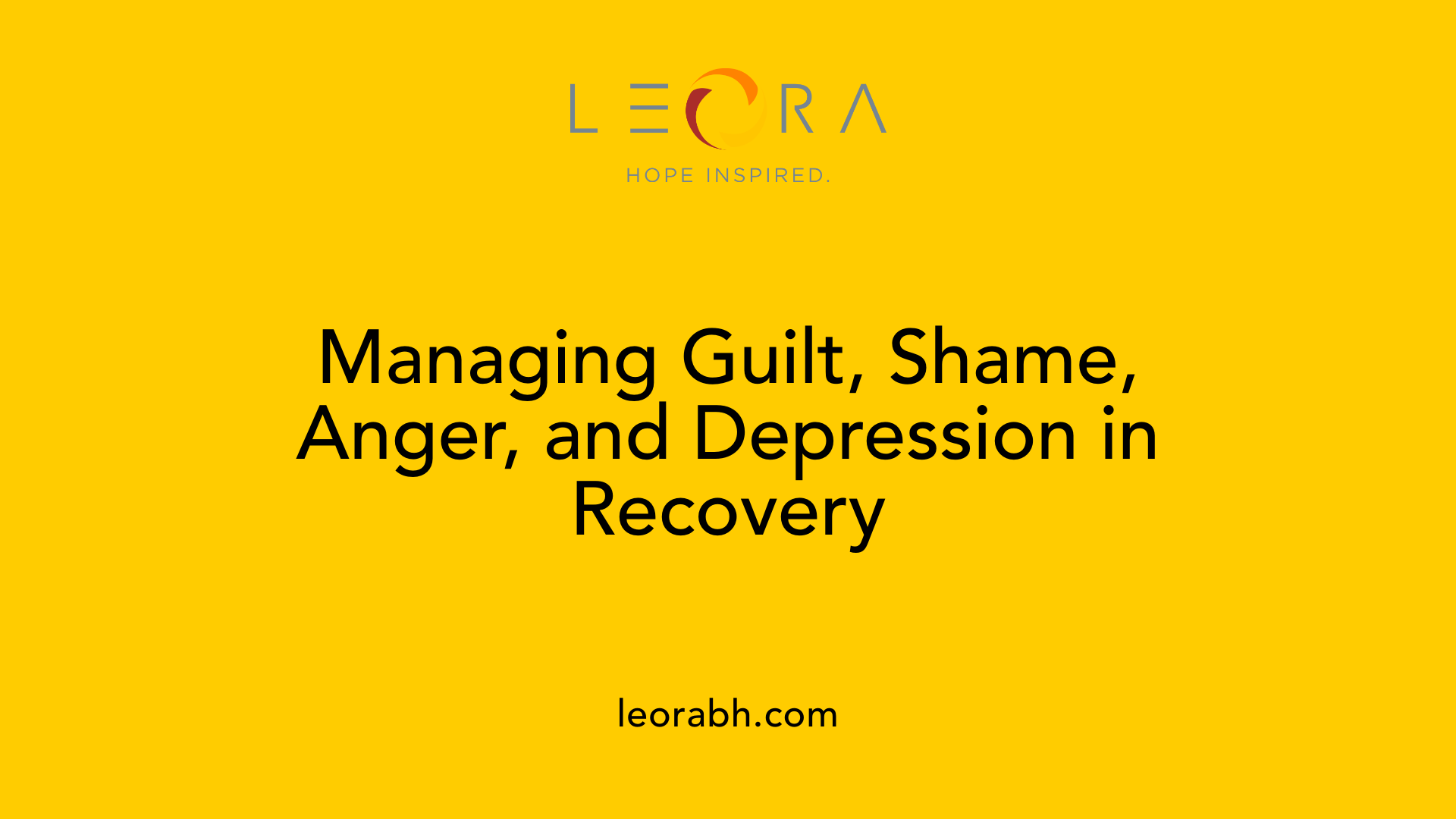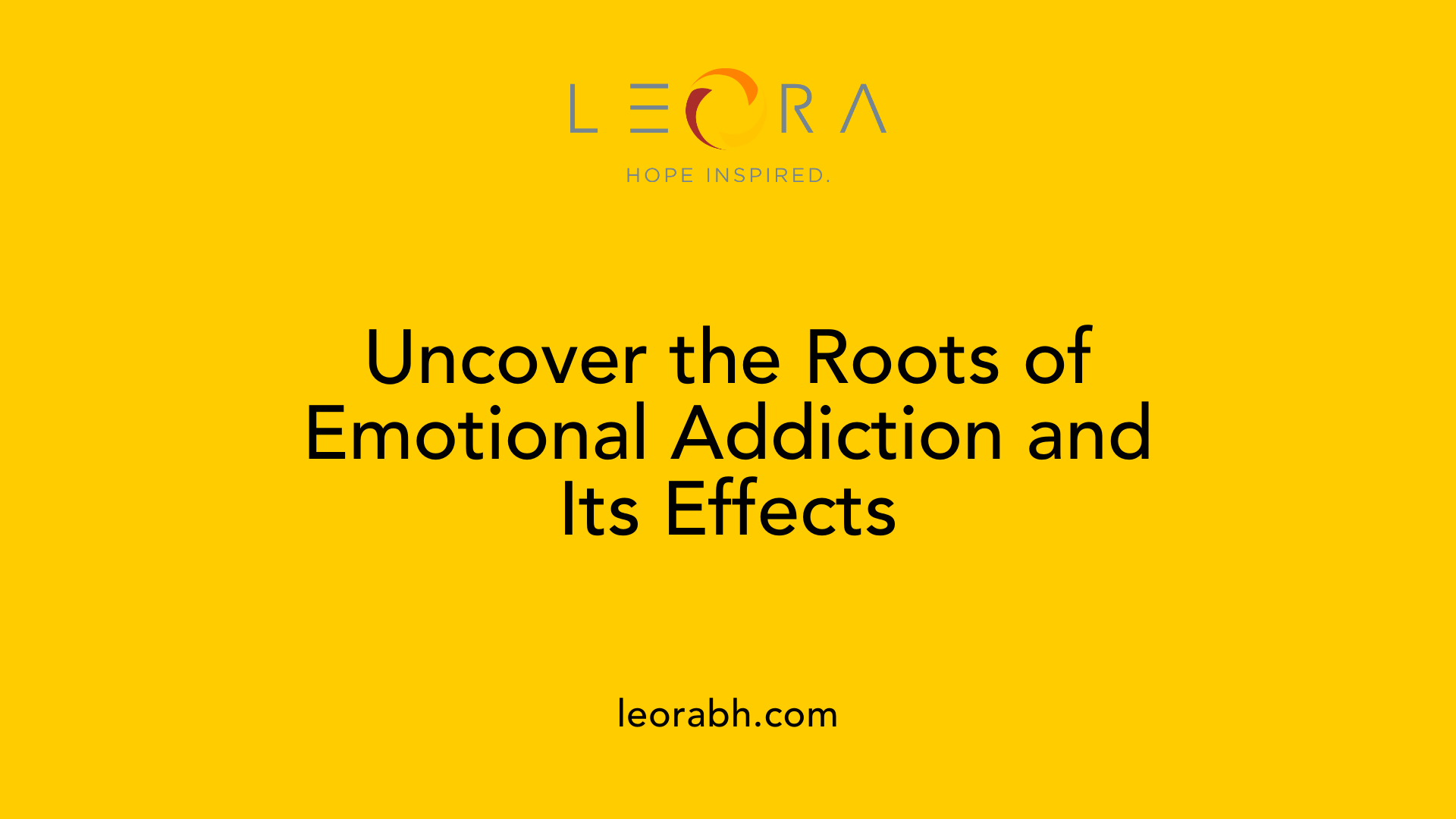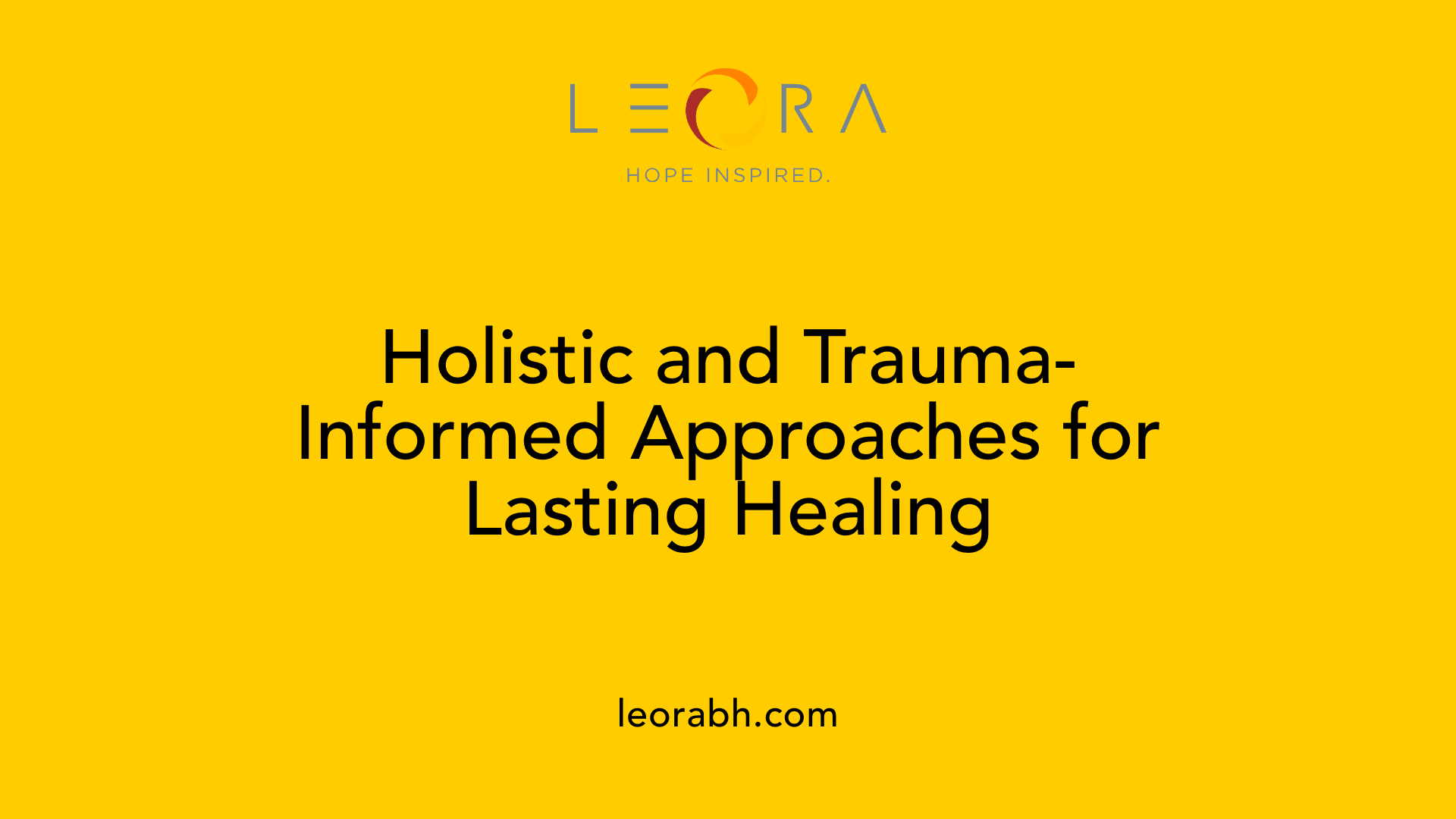What it means to heal emotionally from addiction
The Transformative Power of Emotional Healing in Addiction Recovery
Understanding Emotional Healing: The Heart of Recovery
Healing from addiction encompasses more than just abstaining from substances; it involves addressing deep-seated emotional wounds, trauma, and unhealthy patterns that underpin substance use. Emotional recovery is a vital component of holistic addiction treatment, fostering resilience, emotional stability, and long-term sobriety. This article explores the multifaceted process of healing emotionally from addiction, emphasizing the importance of trauma-informed care, emotional intelligence, and support systems.
The Complex Interconnection Between Trauma and Addiction
How do trauma and addiction influence each other?
Trauma and addiction are deeply intertwined, with unresolved traumatic experiences often serving as triggers for substance use. When individuals experience trauma—such as abuse, loss, or neglect—their brain's stress response systems become dysregulated, leading to heightened feelings of hyperarousal, anxiety, and emotional instability.
Many turn to substances as a way to self-medicate, numbing emotional pain and alleviating trauma symptoms. This cycle can quickly lead to dependence, creating a complex relationship where trauma fuels addiction, and addiction recovery becomes more challenging without addressing underlying emotional wounds.
In treating these co-occurring issues, trauma-informed care plays a pivotal role. This approach recognizes the profound impact of trauma on brain function, behavior, and mental health. Instead of focusing solely on the addiction, these therapies aim to create a safe and supportive environment where clients can process their trauma without retraumatization.
Evidence-based strategies like Eye Movement Desensitization and Reprocessing (EMDR), Seeking Safety, and Dialectical Behavior Therapy (DBT) help manage trauma symptoms effectively. These therapies don’t always require detailed trauma recounting but develop coping skills, emotional regulation, and resilience.
Trauma-informed care emphasizes activating the parasympathetic nervous system—the body's natural relaxation response—to counteract the hyperarousal related to trauma.
By integrating trauma understanding into addiction treatment, practitioners can improve long-term recovery outcomes. Addressing the root trauma alongside substance use helps individuals heal emotionally, rebuild trust, and develop healthier coping mechanisms, reducing the likelihood of relapse.
What types of trauma impact addiction?
Various traumatic experiences influence addiction development, including:
| Type of Trauma | Examples | Impact on Addiction Development |
|---|---|---|
| Emotional Trauma | Bullying, neglect, emotional abuse | Can lead to emotional dysregulation and reliance on substances for relief |
| Physical Trauma | Injuries, violence | Creates stress and bodily pain, encouraging self-medication |
| Childhood Adverse Events | Abuse, parental loss, instability | Often results in ineffective coping, fostering substance use as escape |
| PTSD and Related Disorders | War, assault, natural disasters | Heightened hyperarousal and intrusive memories increase vulnerability to self-medication |
Understanding these trauma types helps tailor treatment plans that address specific emotional wounds.
Which trauma-informed care approaches are effective?
Trauma-informed care involves several therapeutic approaches designed to address both trauma and addiction simultaneously. Some of the most effective include:
- Eye Movement Desensitization and Reprocessing (EMDR): Facilitates processing traumatic memories through guided eye movements, reducing their emotional charge.
- Seeking Safety: Provides skills training for managing trauma and substance use without requiring clients to relive traumatic events.
- Dialectical Behavior Therapy (DBT): Focuses on emotional regulation, distress tolerance, and interpersonal effectiveness, helping clients cope with trauma-related impulses.
- Cognitive-Behavioral Therapy (CBT): Addresses thought patterns linked to trauma and addiction, promoting healthier responses.
- Trauma-Focused Cognitive Behavioral Therapy (TF-CBT): Specifically designed for trauma processing with a gentle, structured approach.
Implementing these therapies within a holistic, supportive environment enhances recovery by addressing the emotional underpinnings of addiction. These approaches foster resilience, emotional regulation, and coping capacity, ultimately supporting sustained sobriety and emotional well-being.
The Role of Emotional Healing in Sustaining Recovery

How can emotional healing support addiction recovery?
Emotional healing is fundamental to overcoming addiction because it addresses the roots of many substance use issues—trauma, guilt, shame, and difficulty managing intense feelings. When these emotional wounds are acknowledged and treated, individuals can develop healthier patterns for handling stress and setbacks.
Developing emotional intelligence enhances this process. Emotional intelligence involves recognizing one’s emotions, understanding their causes, managing responses, and cultivating empathy and social skills. This self-awareness and regulation foster resilience, making it easier to resist triggers and cravings.
Various techniques support emotional healing and growth. Mindfulness practices, such as meditation and deep breathing, allow individuals to observe their feelings without judgment, reducing impulsivity. Therapeutic approaches like Cognitive-Behavioral Therapy (CBT), Dialectical Behavior Therapy (DBT), and Expressive Arts Therapy offer safe outlets for emotional expression, helping to rewire neural pathways associated with harmful emotional patterns.
Building and strengthening emotional connections with family, friends, and support groups create a supportive environment for sustained recovery. These connections promote feelings of acceptance, understanding, and belonging, which are crucial for maintaining motivation and confidence.
Ultimately, emotional healing fosters a renewed sense of purpose and self-esteem, empowering individuals to build a healthier, more balanced life post-addiction. It transforms emotional challenges into opportunities for personal growth, making sobriety sustainable over the long term.
| Aspect | How It Supports Recovery | Additional Notes |
|---|---|---|
| Emotional Trauma Resolution | Uncovers and heals past wounds | Essential for breaking the cycle of self-medication |
| Emotional Intelligence Development | Recognizes, manages, and harnesses emotions | Enhances stress management and impulse control |
| Balance and Resilience | Builds capacity to face setbacks | Supports relapse prevention |
| Connection & Support | Fosters social bonds and understanding | Reinforces commitment to sobriety |
| Therapeutic Techniques | Provides tools for emotional regulation | Includes CBT, DBT, mindfulness, creative arts |
Embarking on emotional healing is a continuous journey that significantly enhances the effectiveness of addiction treatment. By cultivating emotional resilience, individuals are better equipped to navigate life's challenges without turning to substances, leading to lasting recovery and well-being.
Navigating Emotional Challenges: Guilt, Shame, Anger, and Depression

What emotional challenges are common in addiction recovery, such as guilt, shame, depression, and anger?
In addiction recovery, individuals often encounter a range of intense emotional challenges. Guilt and shame are prevalent as they reflect remorse over past actions and the damage caused by addiction. Feelings of guilt may arise from behaviors like lying, neglecting responsibilities, or hurting loved ones, while shame can stem from internalized beliefs of being unworthy or defective.
Depression, characterized by persistent sadness, fatigue, and loss of interest, frequently accompanies recovery, especially when confronting underlying trauma or emotional pain. It can also be a side effect of chemical imbalances altered by substance use.
Anger, whether expressed openly or suppressed internally, is another common emotion. It often ties back to feelings of frustration, betrayal, or loss associated with addiction and recovery processes.
Additionally, many individuals face chronic anxiety, emotional numbness, and difficulty trusting others, which complicate the healing journey. Intrusive memories and emotional triggers can lead to setbacks if not managed properly.
Understanding these emotional challenges is vital. They are natural responses to the upheaval caused by addiction and recovery efforts. Addressing them requires a combination of emotional regulation strategies, mindfulness practices, and professional therapy.
Therapies like Dialectical Behavior Therapy (DBT) are particularly effective in teaching skills to manage intense emotions. Building a strong support network—including family, friends, and support groups—provides emotional safety and encouragement.
Engaging in meaningful activities, practicing self-compassion, and developing healthy coping mechanisms are essential steps. Patience from oneself and guidance from mental health professionals can foster resilience, making it possible to navigate these emotional landscapes successfully.
Ultimately, embracing and working through these feelings is crucial for sustained recovery. It promotes emotional healing, reduces relapse risk, and helps individuals rebuild a stable, purposeful life.
Understanding Emotional Addiction: Development, Symptoms, and Impact

What is emotional addiction, how does it develop, and what are its symptoms?
Emotional addiction is a psychological dependency on specific feelings or emotional states. Unlike substance addiction, which involves physical reliance on drugs or alcohol, emotional addiction centers on a compulsive need to experience certain emotions for comfort or escape.
This form of addiction often develops from early life experiences, trauma, or prolonged exposure to negative emotions. For example, individuals who grew up in chaotic or unstable environments may find familiar emotional patterns—such as anger, fear, or guilt—have a soothing effect, making these feelings a go-to method for managing stress.
Habitual responses to triggers solidify emotional patterns over time. The brain’s limbic system, which governs emotions, reinforces these associations, often leading to ingrained routines of seeking out specific emotional states. These behaviors become habitual, with individuals unconsciously seeking the same feelings to feel 'normal' or in control.
Signs of emotional addiction include compulsive emotional reactions, dependence on certain relationships or situations for emotional validation, and difficulty managing feelings without resorting to distraction or avoidance. People may find themselves repeatedly seeking drama, chaos, or reassurance, despite adverse consequences.
Similar to substance addiction, emotional addiction can impair decision-making, damage personal relationships, and diminish overall well-being. Overcoming it involves developing awareness of emotional triggers, practicing self-compassion, and cultivating healthier coping mechanisms. Building emotional resilience and learning to manage feelings effectively are crucial steps toward recovery and emotional stability.
Holistic and Trauma-Informed Care: Foundations for Emotional Healing

Why is holistic and trauma-informed care important in emotional healing from addiction?
Holistic and trauma-informed care play a vital role in emotional recovery from addiction because they aim to treat the whole person, not just the substance use. These approaches recognize that addiction often involves complex emotional, physical, and psychological factors, many of which are rooted in prior trauma.
Trauma-informed care creates a safe environment by understanding past traumatic experiences such as abuse, neglect, or loss that may contribute to substance use. This approach fosters trust, empowerment, and emotional safety, which are essential for effective healing.
Incorporating holistic therapies like yoga, meditation, art therapy, and mindfulness complements traditional treatments. These methods help regulate emotions, reduce stress, and improve overall mental well-being.
By addressing trauma and fostering emotional stability, holistic and trauma-informed care encourages greater engagement in recovery programs. It also minimizes the risk of re-traumatization, helping individuals rebuild their self-worth and resilience.
Integrating these approaches with evidence-based therapies enhances the chances of long-lasting sobriety and emotional health. It ensures that treatment supports physical health, mental clarity, emotional resilience, and personal growth, ultimately fostering a sustainable path to recovery.
Components of holistic and trauma-informed treatment
Holistic and trauma-aware programs typically include:
| Component | Description | Purpose |
|---|---|---|
| Trauma screening | Assessing trauma history | Identify underlying trauma to tailor treatment |
| Safe environment | Creating physical and emotional safety | Build trust and reduce re-traumatization |
| Evidence-based therapies | CBT, EMDR, DBT | Process trauma and develop coping skills |
| Mind-body practices | Yoga, meditation | Enhance emotional regulation and reduce stress |
| Creative therapies | Art, music, dance therapy | Facilitate emotional expression |
| Integrative health | Nutrition, acupuncture, exercise | Support physical recovery and mental health |
| Culturally responsive care | Respecting individual backgrounds | Ensure treatment relevance and comfort |
These components work together to foster emotional resilience and address deep-seated trauma.
Benefits for long-term recovery
Adopting holistic and trauma-informed healthcare offers numerous benefits. It not only helps individuals overcome substance dependence but also improves overall emotional and mental health. These approaches contribute to greater treatment engagement, reduce the chances of relapse, and promote a stronger sense of self-awareness.
Long-term recovery depends on addressing root emotional wounds and building resilience. Holistic, trauma-sensitive treatment supports this by encouraging self-care, emotional regulation, and rebuilding relationships.
Furthermore, these care models empower individuals with tools for managing life's stresses without substances, leading to improved quality of life.
In conclusion, holistic and trauma-informed approaches are fundamental in creating a supportive, effective framework for emotional and physical healing, significantly increasing the chances of lasting sobriety and well-being.
Principles and Stages of Emotional Recovery from Addiction

What are the principles and stages involved in emotionally recovering from addiction?
Emotional recovery from addiction is a transformative journey grounded in several guiding principles. Central to this process are cultivating hope, fostering self-awareness, taking responsibility, practicing humility, and showing self-compassion. These principles emphasize the importance of a person-centered, holistic approach that respects individual backgrounds, needs, and cultural contexts.
The recovery journey unfolds through distinct stages. It begins with admitting the existence of a problem, which is a crucial first step in acknowledging the need for change. Following this, developing willingness and courage to seek help becomes essential. This often involves engaging in therapy, joining support groups, and opening oneself to new coping strategies.
Establishing effective ways to manage emotions—such as emotional regulation techniques, mindfulness, and stress reduction—are vital steps. Building resilience is an ongoing task, achieved through continuous self-discovery, setting achievable goals, and embracing personal growth.
Recovery is not a one-time event but a continuous process of managing emotional health. It requires ongoing effort to maintain emotional stability, address underlying trauma, and recognize triggers that could lead to relapse.
Relapse can occur, but it should be viewed as a learning opportunity rather than failure. Each setback offers insights into improving coping skills and reinforces the importance of persistence.
Ultimately, successful emotional recovery integrates multiple dimensions—medical treatment, psychological therapy, social support, and spiritual practices—to promote a balanced, self-directed life. This life is aligned with one's purpose and actively involved in the community, fostering long-term well-being and resilience.
Embrace the Journey Toward Emotional Wellness
Healing emotionally from addiction is a profound journey that involves understanding the deep-rooted traumas, developing emotional intelligence, and fostering supportive relationships. Integrating trauma-informed care, evidence-based therapies, holistic practices, and personal commitment creates a foundation for lasting recovery. Recognizing and addressing emotional challenges like guilt, shame, and anger paves the way for inner peace and resilience. Ultimately, emotional healing transforms the recovery journey into a path of self-discovery, self-compassion, and renewed purpose, guiding individuals toward a healthier, more balanced life.
References
- Importance Of Emotional Recovery - Freedom Addiction
- What Is Emotional Addiction? | Sun County Wellness
- Understanding Addiction: Truth, Treatment, and Hope
- Emotional Habits and Addiction - 7 Summit Pathways
- Mental Health & Addiction Recovery - RockBridge Treatment
- How to Heal From Guilt and Shame in Recovery
- Unresolved Trauma and Addiction | Sierra Health & Wellness
- Building Emotional Intelligence in Addiction Rehab | Grand Falls
Find Your Inner Light
Related Articles
Schedule an Assessment
Leora Behavioral Health provides comprehensive treatment services, including ambulatory detox, mental health IOP, and SUD IOP, to support your journey toward lasting recovery.
Our caring team will guide you through the admissions process and create a personalized treatment plan tailored to your unique needs. We welcome walk-ins. If you or a loved one is struggling, reach out today. We’re here to help.


.svg)




.svg)
.svg)
.svg)
.svg)
